|  |  | 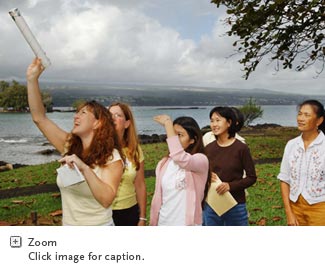 A diverse suite of Journey through the Universe professional development workshops provides educators training on powerful tools for the science classroom—lessons in the Earth and space sciences that address the community’s curricular needs in STEM disciplines, and are instructionally designed for conceptual understanding, learning through inquiry, and ease of use in the classroom. The community’s choice of Education Module, or a customized compendium of lessons, serves as the workshop curriculum. The instructional pedagogy for the workshops is to get teachers of science—many of whom are elementary school generalists with limited science background—excited about science, scientists, and science education, using a presenter team consisting of a space science researcher (the Visiting Researcher) A diverse suite of Journey through the Universe professional development workshops provides educators training on powerful tools for the science classroom—lessons in the Earth and space sciences that address the community’s curricular needs in STEM disciplines, and are instructionally designed for conceptual understanding, learning through inquiry, and ease of use in the classroom. The community’s choice of Education Module, or a customized compendium of lessons, serves as the workshop curriculum. The instructional pedagogy for the workshops is to get teachers of science—many of whom are elementary school generalists with limited science background—excited about science, scientists, and science education, using a presenter team consisting of a space science researcher (the Visiting Researcher) 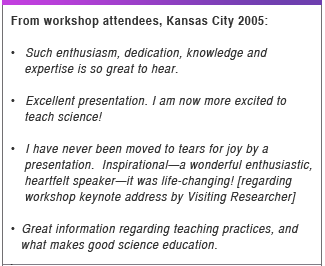 and space science educator (the Visiting Educator), and training that models best teaching practices for the science classroom. It is a recipe for workshop delivery that ensures the audience is immersed in rich and accurate scientific content, the process of scientific inquiry as practiced by researchers, and effective science pedagogy—because the presenters have deep authentic experiences in these areas. and space science educator (the Visiting Educator), and training that models best teaching practices for the science classroom. It is a recipe for workshop delivery that ensures the audience is immersed in rich and accurate scientific content, the process of scientific inquiry as practiced by researchers, and effective science pedagogy—because the presenters have deep authentic experiences in these areas.
The workshops are not canned programs. Each is fully customized for the community, and the presenters that will deliver the workshop work directly with the community’s Local Team on objectives, agenda, and roles and responsibilities. A menu of workshops is provided at the bottom of the page. | | |  | - Provide attendees an understanding of the entire Journey through the Universe program customized for the community. Specifically, provide an understanding of:
- Mobilize the education community in support of the other Journey program elements, and identify their possible roles in those programs.
- Provide a clear understanding of the chosen Education Module, including: the lesson structure; the storyline across the lessons, lesson objectives; and connections to national and local standards.
- Provide training on the lessons and model best teaching practices for facilitation of inquiry-based exploration in the science classroom (of particular importance to elementary teachers with limited science background.)
- Demonstrate that space science education—which is often considered difficult to teach given one cannot do hands-on science with, e.g., planets and stars—is straightforward, and conceptually powerful, if modeling is embedded in lessons and inquiry-based activities.
The National Center for Earth and Space Science Education conducts assessment of the Professional Development component of the Journey through the Universe program. | | |  | You can design a workshop program that meets the professional development needs of your community. It might be a single workshop in advance of a week of Classroom Visits and Family and Public Programming—the Journey through the Universe Week model. Or it might be a series of day-long workshops spread throughout the year, even a week-long Summer Institute, all serving as the basis for small National Teams arriving at various times throughout the year to deliver Classroom Visit and Family and Public Programs.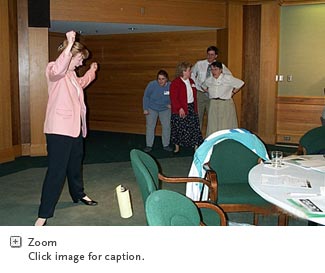 Criteria for design of your workshop program will likely include the grade levels you want to reach, and when during the year Earth and space science are taught at those grade levels. You may also want to explore insertion of Journey through the Universe lessons into the curriculum, or development of a customized compendium of lessons, and design an effective professional development program to introduce those lessons to the teaching staff. Some important aspects of the professional development workshops: - Workshop Cost Model: All workshop attendees require a training package consisting of a notebook of lessons, and supplies for the inquiry-based activities to be done at the workshop.
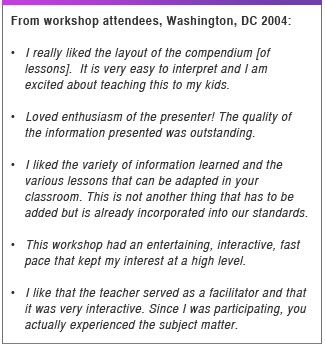
- Supplies for Inquiry-based Activities: our philosophy for design of the activities is to use readily available, low cost supplies, e.g., a paper towel tube, aluminum foil, paper, and rubber-bands, to deliver conceptually powerful lessons. This removes the need for expensive classroom kits, and an infrastructure for their replenishment.
- Lesson Availability: We do not charge for the lessons. We make them all available free as PDF files.
This approach is taken to ensure that a community can get as many teachers trained as they desire, without the budget limitation imposed by the typical cost per attendee model for workshop delivery. If the community takes on responsibility for producing the lesson notebooks, and gathering the supplies, then there is no difference in cost between a workshop for 60 and one for 200. If the community wants us to produce the notebooks and gather the supplies, then we can do that on a strictly full cost recovery basis, and the cost will be reflective of the total number of attendees. A school district’s in-house capabilities may allow them to, e.g., produce the notebooks at a lower cost than us contracting with a copying company. - Master Teachers and Master Teacher Workshops: The community’s Local Team, whose members reflect all local partner organizations, enables all Journey through the Universe programming by working closely with the schools, museums, and science centers to define and schedule programming. The Local Team should include Master Science Teachers as a science leadership team. They serve a number of functions that can be critical for program success:
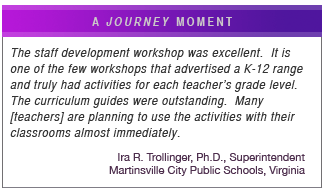 - they are local resources to the teachers in their community, e.g., local experts on the lessons;
- serve as liaisons between the local education community and the Journey program team at the National Center for Earth and Space Science Education; and
- can help ensure program sustainability by integrating program resources made available by the Center on an ongoing basis into local workshops they conduct, classrooms programs, and informal education events.
In order to ensure that the corps of Master Science Teachers can serve in these capacities, Journey through the Universe also offers educator workshops specifically for them. - Grade K-12 Combined Workshops: The content focus of each Education Module addresses the same ‘storyline’ in each of its grade level units, though the content varies to reflect grade level standards. For instance, the Voyage Module addresses the power of models, and includes modeling of motions in the sky at lower elementary, modeling daily and seasonal patterns and cycles on Earth and other planets for upper elementary, and modeling the Solar System at middle school. Journey therefore offers the unique ability to provide a single workshop for K-12 teachers.
For these workshops, elementary, middle, and high school teachers each have their own area at the workshop venue. The presenters first facilitate exploration of one aspect of the storyline with all attendees, e.g., What is a model? All attendees are then guided to collectively come up themselves with the associated hands-on activities at each grade level—which happen to be written up in each of the Module’s grade level units. Finally, each grade level of teachers conducts only their activity, and shares the results with all. It is an approach that provides content continuity across the teaching staff, and gives teachers the ability to adapt lessons up or down in grade level. |  | Below is a list of workshop options, including any objectives that are specific to that workshop option— - Journey Educator Workshops for Grade K-12 Educators, Museum/Science Center Educators, and Pre-Service Educators
Program footprint: half-day to 2-day workshops for 30 to 200 educators.
Audiences: customizable to classroom educators; pre-service students; and museum/science center education staff (educators, docents, explainers.) A single workshop can also be designed so that all three educator groups can be invited.
Grade level: customizable to a specific grade’s curriculum, or across a grade level (K-4, 5-8, 9-12, or K-12 combined). 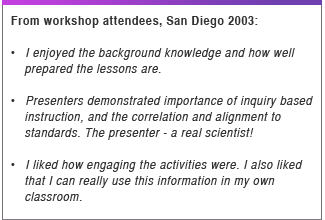 - Master Teacher Workshop
Program footprint: 1/2-day to 1-day workshop for the (typically 10-20) master science teachers on the community’s Local Team.
Concept: held a day in advance of a Journey Educator Workshop, it is required only if the attendance at the Journey Educator Workshop is to exceed 60, which is too large an inquiry-based workshop for the National Team presenters to oversee alone.
Objectives: provide master teachers an overview of the Journey Educator Workshop on the following day; provide training on the inquiry-based activities to be conducted the following day so they can help address attendees questions while the activities are being done; and go over roles and logistics in terms of Workshop prep, delivery, and breakdown. - Week-long Summer Institute—Model 1: A Train-the-Trainers Institute
Program footprint: 4 to 5 days of contact time.
Concept: intensive workshop for the community’s master science teachers. This team has the ability to conduct professional development training, on a regular basis, for the community’s general teaching staff. It is a model for professional development sustainability in the community.
Topics covered: training on: lessons, workshop design, workshop assessment, and available resources. - Distance Learning Workshop for Master Teachers
Program footprint: 1/2-day video-conferencing workshop for the community’s master science teachers.
Concept: low-cost training on new Journey lessons, providing the master science teachers new content on an ongoing basis for workshops they conduct in their community. - Week-long Summer Institute—Model 2: A Workshop Cluster
Concept: the presenter team holds back-to-back workshops over the course of a week in the summer, each workshop for a different audience. A Master Teacher Workshop is held first so that the succeeding workshops can have attendances of any size. Some examples: |  | - Partnership Workshop For A Community's Non-Education Specialists
Program footprint: half-day workshop for 20-40 attendees.
Concept: a workshop that engages local area institutions and individuals who are interested in collaborating with area school districts on education programs.
Objectives: foster buy-in for the Learning Community Model; provide templates for collaboration in education between the local education community and community-based professionals and organizations, e.g.: curriculum development, shadow experiences, school-to-work programs, behind-the-scenes tours of research facilities, internships, and training of local researchers to visit classrooms and conduct family and public programs as part of a program sustainability plan.
Presenters: usually a team comprised of local area educators/school district staff, and a Visiting Educator and Visiting Researcher. The Workshop is typically held while the National Team is in the community conducting Classroom Visits and Family and Public Programs. |  | Scheduling, advertising, setting up, conducting, and breaking down, educator workshops can require a significant effort, particularly if the attendance is large.workshops are a team effort by both National and Local Teams. Download a roles and responsibilities document that does a good job of covering all the bases.
| | |
